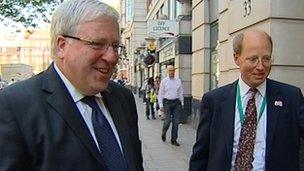New transport secretary's Heathrow baggage
- Published

Patrick McLoughlin, left, became Transport Secretary in last week's reshuffle.
The elevation of Patrick McLoughlin from Chief Whip to Transport Secretary prompted furious speculation that the government was about to break its pledge not to build a third runway at Heathrow.
Mr McLoughlin - seen as carrying "no baggage" on the issue - was shuffled in and Justine Greening, a fierce opponent of a new runway, was shuffled out to international development.
This was all swiftly followed by the setting up of a commission, led by ex-Financial Services Authority boss Sir Howard Davies, to examine ways to expand airport capacity - reporting back in 2015.
But the new transport secretary is no stranger to the issue of airport expansion in the south east of England, having served as the aviation minister under Margaret Thatcher and John Major from 1989 to 1992.
At the time, the UK was entering recession and there were concerns that the country wasn't keeping up with its European competitors.
The airline industry was growing with the increase of low-cost airlines and politicians and businessmen were already worried about how the south east of England would cope with ever-expanding air travel.
Mr McLoughlin acknowledged how important the matter was, saying international aviation had "come to play a central role in all countries' economic fortunes".
In 1988, the government tasked the Civil Aviation Authority with looking ahead 15 years to assess what might be needed to make sure London's airports did not become congested.
Reporting back in 1990, the authority said air traffic in the south east of England would reach saturation point by 2005 and suggested extra runways were needed at one of London's airports, with the best option, in terms of costs to passengers, a third runway at Heathrow.
But Mr McLoughlin's boss at the time, Transport Secretary Cecil Parkinson had environmental concerns. He said he was "acutely aware of the impact of airport development on the environment, on employment, and on local infrastructure".
'No complacency'
Mr McLoughlin told the Commons that he would not "wholly rule out" putting a new runway at Heathrow, adding, to mocking laughter, that the way forward was to set up a working group.
And so it was done, but not without Mr McLoughlin addressing what now sounds like some familiar concerns: "In recent months, there have been some comments about the dire consequences that would result if the United Kingdom lost its prominent position in European civil aviation through the inadequacy of the airports infrastructure.
"Such talk is unnecessarily gloomy."
He said new terminals at Heathrow in 1986, the opening of London City Airport in 1987 and a new terminal at Gatwick in 1988 was "by any standards" an "excellent record of achievement - while others talk, we get on with the job".
He insisted there was "no question of any complacency in the government".
However, it was several years until the working group reported in 1993, by which time Mr McLoughlin had moved on to pastures new as an employment minister.
And it took another two years - 1995 - for the government, which in the meantime had given the go ahead for Heathrow's terminal five, to respond to its findings.
It admitted there was a "strong case" for more runways in the south east, but - contrary to the working group's conclusions - said a third runway at Heathrow or a second runway at Gatwick should not be considered.
Labour returned to the issue while in government, eventually outlining plans in 2009 for a third runway at Heathrow to meet passenger demand.
But the plan never got off the ground and in 2010 the coalition agreement put a stop to all new runways at Heathrow, Gatwick and Stansted until 2015.
With Sir Howard Davies' commission not due to report until after the next general election, Mr McLoughlin may once again miss out on the chance to finish a job he started over twenty years ago.
- Published9 September 2012
- Published7 September 2012